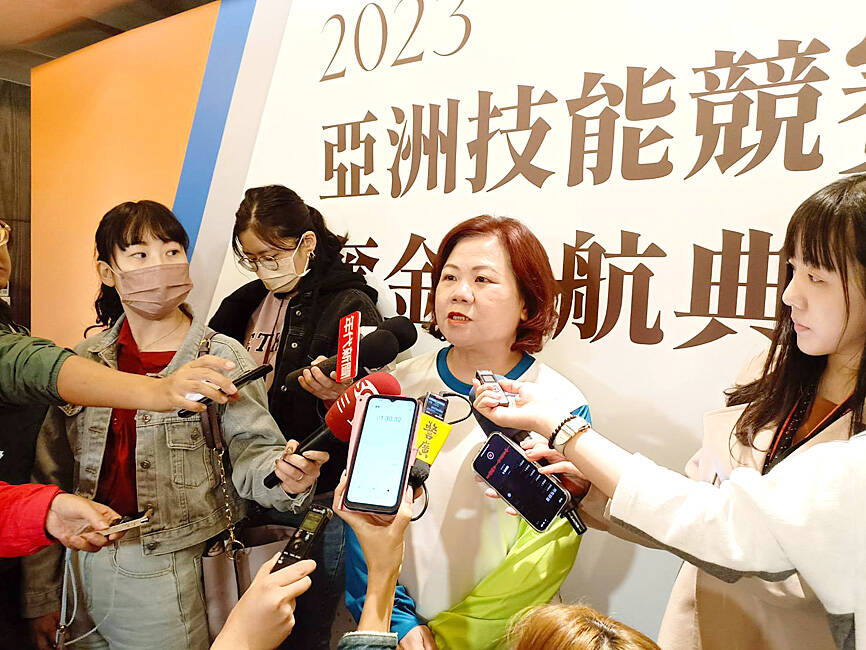Minister of Labor Hsu Ming-chun (許銘春) yesterday said that Taipei and New Delhi are to sign a memorandum of understanding (MOU) before the end of this year allowing for Indian migrant workers to come to Taiwan.
The Ministry of Labor is still in talks with India on when the agreement would be signed, Hsu said on the sidelines of an event in Taipei for participants of the upcoming WorldSkills Asia Competition.
Her remarks came after a source last week said that the two sides had almost completed initial discussions on the MOU and that the signing was scheduled for the end of the year to help address a labor shortage.

Photo: Lee Ching-hui, Taipei Times
The source, who declined to be named, also said that Taiwan and India had been negotiating the agreement since 2020, but that talks had been stalled due to the COVID-19 pandemic.
Some reports have said that Taiwan could open its doors to as many as 100,000 migrant workers from India, but Hsu said the number was still being considered as it depended on the needs of industries and the qualifications of the workers.
After the MOU is signed, working-level meetings would be held to iron out the details, she said, indicating that once they are finalized, there would be an official announcement on the deal.
At a news conference on Thursday, Indian Ministry of External Affairs spokesman Arindam Bagchi said that he hoped the migrant worker MOU would be signed as soon as possible, as the pact is expected to benefit both parties.
“Negotiations by their very nature tend to not have a finite timeline,” Bagchi said. “But we hope that they will be concluded in due course and that it will soon be possible to benefit from this mobility partnership.”

Chinese spouse and influencer Guan Guan’s (關關) residency permit has been revoked for repeatedly posting pro-China videos that threaten national security, the National Immigration Agency confirmed today. Guan Guan has said many controversial statements in her videos posted to Douyin (抖音), including “the red flag will soon be painted all over Taiwan” and “Taiwan is an inseparable part of China,” and expressing hope for expedited reunification. The agency last year received multiple reports alleging that Guan Guan had advocated for armed reunification. After verifying the reports, the agency last month issued a notice requiring her to appear and explain her actions. Guan

GIVE AND TAKE: Blood demand continues to rise each year, while fewer young donors are available due to the nation’s falling birthrate, a doctor said Blood donors can redeem points earned from donations to obtain limited edition Formosan black bear travel mugs, the Kaohsiung Blood Center said yesterday, as it announced a goal of stocking 20,000 units of blood prior to the Lunar New Year. The last month of the lunar year is National Blood Donation Month, when local centers seek to stockpile blood for use during the Lunar New Year holiday. The blood demand in southern Taiwan — including Tainan and Kaohsiung, as well as Chiayi, Pingtung, Penghu and Taitung counties — is about 2,000 units per day, the center said. The donation campaign aims to boost

The Kaohsiung Tourism Bureau audited six hotels in an effort to prevent price gouging ahead of Korean band BTS’ concert tour in the city scheduled for Nov. 19, 21 and 22 this year. The bureau on Friday said that the audits — conducted in response to allegations of unfair pricing posted on social media — found no wrongdoing. These establishments included the local branches of Chateau de Chine, Hotel Nikko, My Humble House, and Grand Hai Lai, it said, adding that the Consumer Protection Commission would have penalized price gougers had the accusations been substantiated. The bureau said the Tourism Development Act

BACK TO WINTER: A strong continental cold air mass would move south on Tuesday next week, bringing colder temperatures to northern and central Taiwan A tropical depression east of the Philippines could soon be upgraded to be the first tropical storm of this year, the Central Weather Administration (CWA) said yesterday, adding that the next cold air mass is forecast to arrive on Monday next week. CWA forecaster Cheng Jie-ren (鄭傑仁) said the first tropical depression of this year is over waters east of the Philippines, about 1,867km southeast of Oluanpi (鵝鑾鼻), and could strengthen into Tropical Storm Nokaen by early today. The system is moving slowly from northwest to north, and is expected to remain east of the Philippines with little chance of affecting Taiwan,